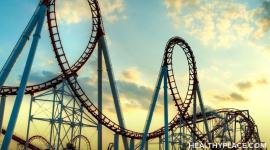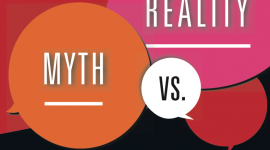Effects of Bipolar Disorder
How Bipolar Disorder Affects Everyday Life
Effects of bipolar disorder can be far-reaching, both into the lives of patients and those around them. Bipolar disorder affects work, school, relationships, physical health and many other aspects of everyday life. In fact, in the early 1990s, it was calculated that the loss of productivity due to bipolar disorder cost $15.5 billion annually.1
The most severe effect of bipolar disorder is suicide. Unfortunately, 25% - 50% of people with bipolar disorder attempt suicide and 11% commit suicide.1
The best way to lessen the effects of bipolar disorder is an accurate, professional bipolar diagnosis and early, appropriate bipolar treatment.
Psychological Effects of Bipolar Disorder
Bipolar disorder is a mental illness known as a mood disorder (read: what is bipolar disorder). In mood disorders, the patient suffers from severe emotional states. In bipolar disorder, the patient suffers from "highs" known as mania or hypomania and "lows" or bipolar depression.
Psychological effects of bipolar are broken down by the type of episodes the person is experiencing. Symptoms during mania / hypomania may include:
- Auditory and visual hallucinations
- Delusions, including delusions of grandeur and thoughts that objects are sending special messages
- Intense anxiety, agitation, aggression, paranoia
- Obsessive worried thoughts and feelings; feeling the need to check something
- Feeling like life is spinning out of control
- Heightened mood, exaggerated optimism and self-confidence
- Racing thoughts; rapidly changing streams of thought; easily distractible
(Read more information about bipolar manic episodes.)
Vast psychological effects are also seen during depressive episodes:
- Prolonged sadness
- Feeling helpless, hopeless and worthless; feelings of guilt
- Pessimism, indifference; reoccurring thoughts of death and suicide
- Inability to concentrate, indecisiveness
- Inability to take pleasure in former interests
(Read more information about Severe Bipolar Depression: Is There Anything That Can Help?)
When the person is not in either type of episode, it's common for them to feel guilt and shame over what they have done, said or felt during the bipolar episode.
Physical Effects of Bipolar Disorder
The physical effects of bipolar disorder come from both the disorder itself as well as its indirect effects. For example, many people with bipolar disorder also develop substance abuse problems in an attempt to medicate the symptoms of bipolar disorder.
The effects of bipolar disorder can also result in negative productivity - in depressive episodes, but productivity can actually increase during hypomanic episodes.2 This irregularity often leads to job loss and emotional instability results in relationship loss. Physical effects of bipolar disorder include:
- Increased physical and mental activity and energy; hyperactivity
- Significant changes in appetite and sleep patterns
- Trouble breathing
- Racing speech
- Social withdrawal
- Loss of energy, persistent lethargy; aches and pains
- Unexplained crying spells
- Poor overall health
- Weight gain; blood pressure and heart problems; diabetes
APA Reference
Tracy, N.
(2021, December 28). Effects of Bipolar Disorder, HealthyPlace. Retrieved
on 2024, November 20 from https://www.healthyplace.com/bipolar-disorder/bipolar-information/effects-of-bipolar-disorder



